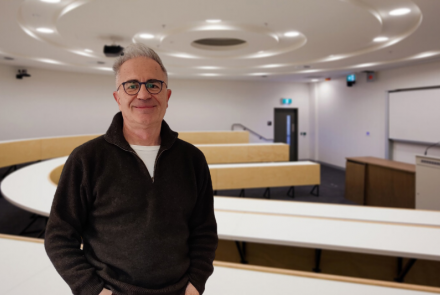
Proud teacher: Meet Luca Tacconi
Crawford School introduces our fantastic staff, so you can meet the people of Asia and the Pacific’s leading graduate policy school.
This time around we talk to Professor of Environmental Governance Luca Tacconi about his research on climate change, biodiversity and livelihoods, and he tells us some of the great stories behind the students that made him incredibly proud.
Why did you choose to work at Crawford School?
I love research, but I am also very interested in contributing practical inputs to public policy. My research focus has always been on developing countries, particularly those in the Asia Pacific, and Crawford School is the best place in the region for that type of work.
Can you tell us a bit more about how your research matters today?
Climate change and the loss of biodiversity are two of the most significant challenges currently faced by humanity. My research focuses on the causes of deforestation and its implications for climate change, biodiversity and livelihoods, and the public policies that could be implemented to reduce the loss of forests.
Can you tell us about a student that has made you particularly proud?
I feel that it is too hard to just mention one, so do allow me to mention at least three who earned their PhD here at Crawford, and have also become good friends and research partners. I recruited Paolo Cerutti, a fellow Italian, into the Center for International Forestry Research (CIFOR) when I worked with them in Indonesia. When I joined ANU, he enrolled in Crawford and studied illegal forest activities in Cameroon. He is now a senior scientist in CIFOR (in Kenya) and a global leader on the issue of illegality in forestry.
Silvia Irawan researched intergovernmental fiscal transfers for the environment in the context of climate change in Indonesia. We published a book together, and when she finished her studies, she married a fellow PhD student from Crawford. They now lead one of the main research-based environmental think tanks in Indonesia, and we still collaborate. Unfortunately, because of COVID-19, I suspect I will not have a chance to visit them in their lovely home in Bali for a while.
Finally, Zahrul Muttaqin, who earned his masters from Fenner School before joining Crawford for a PhD. He researched community-based forest management and climate change in Indonesia with the support of a project funded by the Australian Centre for International Agricultural Research that I led. When he resumed his position as a government research officer, we ran a follow up to that project together, which made him one of the most trusted voices on forests and climate change in the Ministry of Environment and Forestry. Soon after the end of the project he became an advisor to the Minister, and is now deputy director for international cooperation in the same ministry. I look forward to seeing him again when COVID-19 is overcome and I can travel again to Jakarta.
Can you tell us about a feel-good dish that you or someone in your family makes in stressful times?
A comforting dish I love is vegetarian Chinese dumplings that my partner makes quite often for family dinner on Sunday. A passion for home-made food is something that Chinese and Italians really share!
Can you give us your top three tips about how to stay positive during the COVID-19 outbreak?
Stay in touch with family and friends, exercise as much as possible to keep the body and mind healthy, and plan some land-based travel in Australia for when all the borders open and is safe to do so. Reducing emissions from air travel is one of the, if temporary, benefits of COVID-19.
Updated: 5 July 2024/Responsible Officer: Crawford Engagement/Page Contact: CAP Web Team












